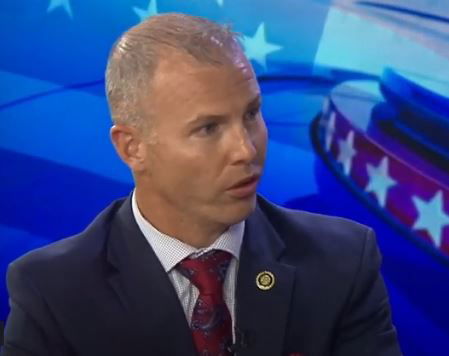Fourth District candidate interviews: Rick Brattin

U.S. Rep. Vicky Hartzler is vacating the Fourth Congressional District seat she’s held for more than a decade.
Hartzler’s run for U.S. Senate has left her House seat open in the November election, with seven Republicans rushing in to fill the vacuum. But they must win the August primary before they can move on to take on the Democratic and Libertarian candidates in November.
Brattin is one of two Republican candidates from Hartzler's hometown of Harrisonville. He brings with him extensive experience in the state legislature.
Lucas Geisler: Let's just start off with what should people know about you.
Rick Brattin: I'm a former United States Marine, a small business owner. But my pride, my life is my family. I have five children, 21 all the way down to eight. I've served in the legislature. I was elected in 2010 and termed out of the House. Now I'm currently a state senator. But now looking to move to Washington.
Geisler: Everyone, no matter your political stripe, you kind of realize how expensive things are right now. So what relief do you see that you can maybe give somebody if you're going to Washington and people are worried about things being expensive? What can you do in this role to help people out with that?
Brattin: I mean, putting a stop to what's going on, the continued spending in the frenzy to continue to print dollars. I mean, we've got to put a full stop on this. And we've got to really dive into the budget in the spending that's causing the printing of this money to devalue your dollar to where when you're going to the pump, you're going into the grocery store, you're not paying astronomical prices. Or when you look at your 401k and see that it is diminished in its value in such a short amount of time. So putting the block, putting the stop immediately, and I think by taking over the House and the Senate, by having those people that are willing to press it and say we have got to address this and address it now.
Geisler: You’re a member of the state Senate right now. It's, in the last couple of years, not necessarily a body that's been known for getting a lot of things done. What about getting things done and getting things passed? Is this something you're up to the task for?
Brattin: Absolutely. I've been wanting to be able to work with people across lines, get things done in the state Senate. Yes, there's a lot of turmoil. But the state Senate, the Senate in general, by design, our founders designed it to be a dysfunctional body. It's not meant to function to where you can pump out legislation. It's not meant to be that. So it's actually functioning how the founders had intended it to. I know people want to get a lot of stuff done. But it's meant to put the brakes on. Why? Because every law we pass it's an infringement on your liberty and freedom. But when you go to Washington, it's creating that vision and having that vision of why our ideas are the right ideas and being able to explain, you know, the process of how we can achieve that and how we can get it done, and why we need to get this done. And I think the people are really clamoring for that leadership, the bold leadership, the no-nonsense, you know, rhetoric that they continue to hear. And I believe that's what I offer.
Geisler: When you get to Washington, would you support a nationwide abortion ban?
Brattin: Oh, absolutely. And I think that's one of our first steps that we've got to take, we've got to look at the budget to ensure that no dollars are going to fund abortion services. Taxpayers expect that. I mean, it doesn't matter what party you're with, by and large, the vast majority do not want their taxpayer dollars going towards that. So we've got to address that. But first and foremost, put that protection on the national ban. Absolutely.
Geisler: Missouri law currently allows for some exceptions for medical emergencies. In this national ban that you're saying that you support, do you see any room for exceptions? Do you see any room for anything like that?
Brattin: I think for the life of the mother, and absolutely, we've got to have those sorts of exceptions. Missouri is right allowing for those exceptions. But if you look at the data, I mean, it's the vast majority are all elective. It's really a small miniscule number that are done in such a manner. So in the grand scheme of things this will really scale back the elective aspect of it.